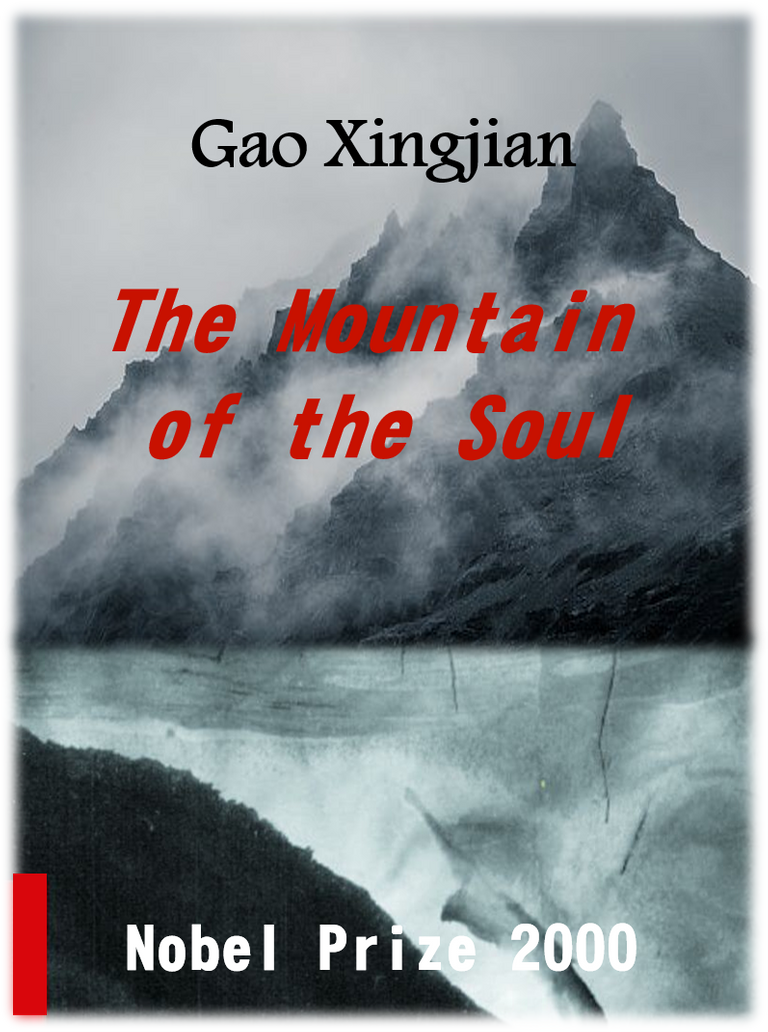[ENG-SPN] The Mountain of the Sould | Book Review

Gao Xingjian
Es un escritor en lengua china. Es dramaturgo y novelista, y su obra más importante es la novela La Montaña del Alma. En la actualidad reside en Francia y es ciudadano francés. En 2000 obtuvo el Premio Nobel de Literatura. Nacimiento: 4 de enero de 1940 (edad 81 años), Ganzhou, República Popular China. Obras: Constelación en una noche fría (1979) | Tal paloma llamada Labios rojos (1984) | Una caña de pescar para el abuelo (1990) | La Montaña del Alma (1990) | El libro de un hombre solitario (1999). Premios: Premio Nobel de Literatura | Orden de las Artes y las Letras.

The protagonist of this story is a Chinese writer who, through a stranger, is shown his destiny, discovering the existence of the Mountain of the Soul. This is how he sets out to dedicate his life to finding this mountain in order to conquer it and reveal its secrets, surrendering himself to his walk, to the road, to the dust of the vehicles, to the fables of the old inhabitants of the villages and to the reverie that fills the mists of the high peaks. A long journey, where the author goes in pursuit of a goal as sublime as it is unattainable: to decipher the meaning of our identity.
The novel begins with two narrators alternating throughout the book, one in second person and the other in first person, the two are traveling through China, one is looking for a mountain he has never seen but that someone named him along the way, starting his journey and search for this. I find it very exciting as it shows us the whole journey through the different villages and towns of China, showing the cultures, customs, in general, the different aspects of the oriental culture that I think for many of us is very unknown. He describes the landscapes to perfection, this is done in a very exquisite way, and I think it is fantastic that he takes us through the immensity of landscapes that I think make us play a little with the imagination, because they are things that we do not see in everyday life.
This book has a very great peculiarity, and it is that throughout the reading you realize that it is not only a journey through China, but it is a journey into oneself, in this case the character. The paradises he travels through, the ones he leaves behind and, let's say, his records, correspond to his childhood and life.
In some occasions the reading becomes tedious, the thread of the plot is lost a little, since he submerges very deep inside himself and does not advance towards his objective, which is the mountain. Another thing that I found very interesting is that at one point the book no longer has two narrators, but the reader discovers that this is only one, and that all the time has been playing with our minds by making us think it is one or the other person, although they are two different people and at the time they converge, there one begins to understand many things, but the thread of how to advance in the story is also lost, because the author stops a lot of time describing landscapes again and again, which seems a bit dense.
In general, it is a book that I recommend to read, which is why it helped the author to win the Nobel Prize for Literature. It consists of 647 pages, it can easily be read in a week and a half if you read it constantly. I particularly consider that it is to read it several times, because it is as I said, a journey into ourselves, whether it is the lost paradises of our childhood, our anecdotes and our personal life.
This is my entry for the FEBRUARY BOOK REVIEW CONTEST: THE BOOK OF LOVE.
El protagonista de esta historia de cuentos es un escritor chino a quien a través de un desconocido la suerte le muestra su destino, descubriendo la existencia de la Montaña del Alma. Es así como se plantea dedicar su vida a encontrar esa montaña para conquistarla y desvelar sus secretos, entregándose a su andar, al camino, al polvo de los vehículos, a las fábulas de los viejos moradores de las aldeas y a la ensoñación que preña las brumas de los altos picos. Un largo recorrido, donde el autor va en pos de un objetivo tan sublime como inalcanzable: descifrar el sentido de nuestra identidad.
La novela empieza con dos narradores alternándose durante todo el libro, uno en segunda persona y el otro en primera persona, los dos van recorriendo China, uno está buscando una montaña que nunca ha visto pero que alguien le nombró a lo largo del camino, empezando su recorrido y búsqueda hacia esta. Me parece muy emocionante ya que nos muestra todo el recorrido por las diferentes aldeas y poblaciones de China, va mostrando las culturas, las costumbres, en general, los diferentes aspectos de la cultura oriental que pienso que para muchos de nosotros es muy desconocida. Nos describen los paisajes a la perfección, esto lo hace de una manera muy exquisita, y me parece fantástico que nos lleve por la inmensidad de paisajes que pienso que nos hacen jugar un poco con la imaginación, porque son cosas que nosotros no vemos en la cotidianidad.
Este libro tiene una peculiaridad muy grande, y es que a lo largo que transcurre la lectura te vas dando cuenta que no sólo es un recorrido por China, sino que es un recorrido al interior de uno mismo, en este caso del personaje. Los paraísos que recorre, los que va dejando y digamos sus constancias, corresponden a su infancia y vida.
En algunas ocasiones la lectura se vuelve tediosa, se pierde un poco el hilo de la trama ya que se sumerge muy profundo en su interior y no avanza hacia su objetivo, que es la montaña. Otra cosa que me pareció muy interesante es que en un momento dado el libro ya no tiene dos narradores, sino que el lector descubre que este es uno solo, y que todo el tiempo ha ido jugando con nuestra mente al hacernos pensar que es una u otra persona, aunque son dos personas distintas y en el momento se convergen, allí empieza uno a entender muchísimas cosas, pero ya se pierde también el hilo conductor de cómo avanzar en la historia, debido a que el autor se detiene gran cantidad de tiempo en describir paisajes una y otra vez, lo que me parece un poco denso.
En general es un libro que recomiendo leer, por algo le sirvió al autor para ganar el premio Nobel de Literatura. Consta de 647 páginas, fácilmente se puede leer en semana y media si lo lees constantemente. Particularmente considero que es para leerlo varias veces, porque es como les dije, un recorrido hacia el interior de nosotros mismos, ya sean los paraísos perdidos de nuestra infancia, de nuestras anécdotas y en nuestra vida personal.
Esta es mi entrada para el CONCURSO DE REVISIÓN DE LIBROS DE FEBRERO: EL LIBRO DEL AMOR.


https://twitter.com/Rafabvr1/status/1360038877667463169
What a great find! I have never known this book nor the author. Given to be honest, I barely read any from Chinese author unless it's philosophical or very classic books. I'll put this on my list... on top of my current list 🤣 I need to catch up with my reading.
This book came into my life years ago, I had never read Chinese authors before but a psychologist friend of mine gave it to me as a gift at a complicated moment in my life. She recommended me to read it and from there I understood that what I considered complicated was really stupidity.
The book allowed me to connect my thoughts, my feelings and my actions. I think it was from that reading that my life really took a radical turn and I began to value the simplicity of life.
Thank you for appreciating my publication.
Greetings.
Pondré este libro en mi lista de libros. Y mas si es sobre montañas, se oye super interesante. Gracias por compartir esta lectura
Que interesante este libro @rafabvr, ese viaje a nuestro mundo interior es necesario, sobre todo en esta época.
Saludos